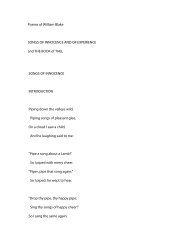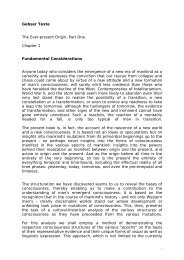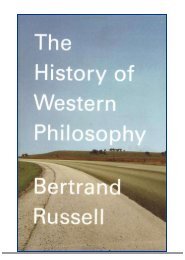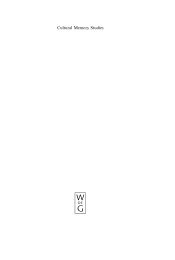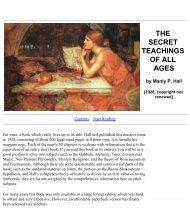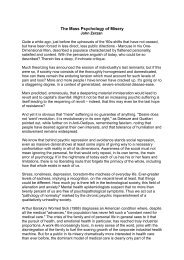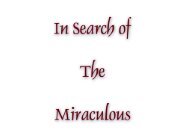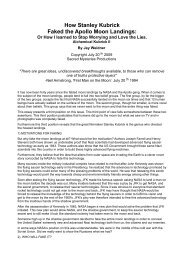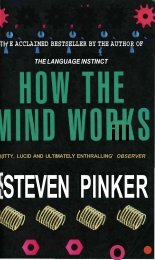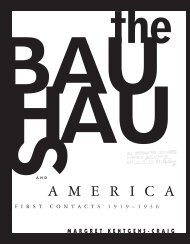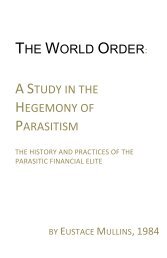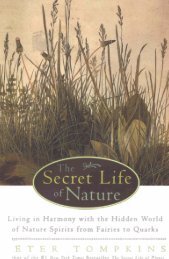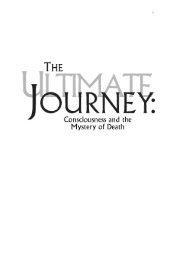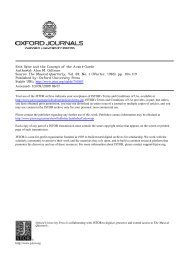- Page 5 and 6:
LAOZIContentsTao In Its Transcenden
- Page 7 and 8:
Tao eludes the sense of sight, and
- Page 9 and 10:
life, and it rejects them not. Its
- Page 11 and 12:
Heaven's net is vast; though its me
- Page 13 and 14:
Tao, he endures for ever. Though hi
- Page 15 and 16:
of agriculture. If Tao does not pre
- Page 17 and 18:
The skilful philosophers of the old
- Page 19 and 20:
epose? But let time go on, and the
- Page 21 and 22:
L Humilityowliness AndLL things in
- Page 23 and 24:
What makes a kingdom great is its b
- Page 25 and 26:
GovernmentNOT exalting worth keeps
- Page 27 and 28:
If the government is sluggish and t
- Page 29 and 30:
people return to the use of knotted
- Page 31 and 32:
prizes. When he conquers, he is not
- Page 33 and 34:
Thirty spokes unite in one nave; th
- Page 35 and 36:
He who acts, destroys; he who grasp
- Page 37 and 38:
He who prides himself upon wealth a
- Page 39 and 40:
The course of things is such that w
- Page 41 and 42:
Even if a man is bad, how can it be
- Page 43 and 44:
This is the Way of Heaven, which be
- Page 47 and 48:
ZHUANGZIContentsThe Doctrine of Rel
- Page 49 and 50:
going up ninety thousand li in orde
- Page 51 and 52:
seen the great ocean, you know your
- Page 53 and 54:
he Identity ofTContraries1.TZu CH'I
- Page 55 and 56:
we cannot see its form. It has func
- Page 57 and 58:
intellect in an obstinate adherence
- Page 59 and 60:
dream they are dreaming; and only w
- Page 61 and 62:
TTaohe MysteriousImmanence of1.THE
- Page 63 and 64:
without thickness into such an inte
- Page 65 and 66:
prevented him from seeing my pent-u
- Page 67 and 68:
4.Books are what the world values a
- Page 69 and 70:
6.Lieh Yu K'ou instructed Po Hun Wu
- Page 71 and 72:
The Hidden Spring1.TAO has its laws
- Page 73 and 74:
4.The universe is very beautiful, y
- Page 75 and 76:
6.“Chi Chen," said Shao Chih, “
- Page 77 and 78:
8.Life has its distinctions; but in
- Page 79 and 80:
The potter says: “I can do what I
- Page 81 and 82:
Passive Virtue1.YEN HUI [1] went to
- Page 83 and 84:
seem to follow the dictates of his
- Page 85 and 86:
may protect men's bodies. He has at
- Page 87 and 88:
3.“Tell me," said Lao Tzu, “in
- Page 89 and 90: S Externalself-Adaptation To1.YEN H
- Page 91 and 92: 2.For travelling by water there is
- Page 93 and 94: him in the administration of the em
- Page 95 and 96: principles, increasing the sum of h
- Page 97 and 98: none of these. Would you like to he
- Page 99 and 100: 4.With the truly wise, wisdom is a
- Page 101 and 102: without calculation, not seeking to
- Page 103 and 104: 7.The repose of the Sage is not wha
- Page 105 and 106: Random Gleanings1.TAKE no heed of t
- Page 107 and 108: 7.Is Confucius a Sage, or is he not
- Page 109 and 110: 13.By inaction one can become the c
- Page 111 and 112: 17.The men of this world all rejoic
- Page 113 and 114: 23.Charity and duty to one's neighb
- Page 115 and 116: 28.The Grand Augur, in his ceremoni
- Page 117 and 118: know not how. You are at rest, but
- Page 119 and 120: 37.Discard the stimuli of purpose.
- Page 121 and 122: 42.When Chu Po Yu reached his sixti
- Page 123 and 124: 46.Man has for himself a spacious d
- Page 125 and 126: ersonalPAnecdotes1.CHUANG TZu was f
- Page 127 and 128: “You not being a fish yourself,"
- Page 129: “We fear," argued the disciples,
- Page 133 and 134: 1天 瑞Tian RuiHeaven's GiftsThe C
- Page 135 and 136: itself untouched by evolution. Self
- Page 137 and 138: function to teach others and to inf
- Page 139: from the standpoint of the Absolute
- Page 143 and 144: scholar, death the appointed end fo
- Page 145 and 146: life, holds cleverness and capacity
- Page 147 and 148: us by their impact."“But what if
- Page 149 and 150: The third year, I reaped a great ha
- Page 151 and 152: same time which of us is not a thie
- Page 153 and 154: practice of enlightened virtue will
- Page 155 and 156: on high, the people bewailed him fo
- Page 157 and 158: as one, is still not so good as pas
- Page 159 and 160: high favour with the prince of Chin
- Page 161 and 162: can walk through the midst of these
- Page 163 and 164: The Animal TamerTHE KEEPER of Anima
- Page 165 and 166: Gulls in MindTHERE WAS once a man,
- Page 167 and 168: The incident came to the ears of Ma
- Page 169 and 170: Chou of the Yin, Huan of the Lu Sta
- Page 171 and 172: endowed with blood and breath. And
- Page 173 and 174: stranger has carried me away by his
- Page 175 and 176: gratification. The magician, howeve
- Page 177 and 178: freshness. He asked where he had co
- Page 179 and 180: the fact that his own body is an il
- Page 181 and 182: description, and subjected to every
- Page 183 and 184: deer, but wrongly took the dream to
- Page 185 and 186: space of seven days no one knew wha
- Page 187 and 188: 4仲 尼Zhong NiConfuciusWho is wis
- Page 189 and 190: Then he said to himself: “Confuci
- Page 191 and 192:
mind to be occupied with the extern
- Page 193 and 194:
“This, however, is doubtless due
- Page 195 and 196:
5湯 問Tang WenThe Questions ofTan
- Page 197 and 198:
Emperor T'ang's Second QuestionT'an
- Page 199 and 200:
these mountains, and was vexed in s
- Page 201 and 202:
The Change of HeartsKUNG-HU of Lu a
- Page 203 and 204:
piece of work, already finished, th
- Page 205 and 206:
The loan of the good swordHEI LUAN
- Page 207 and 208:
light which it emits. The objects w
- Page 209 and 210:
6力 命Li MingEffort & DestinyFate
- Page 211 and 212:
Doctor knowledgeYANG CHU had a frie
- Page 213 and 214:
I must die and leave my kingdom, pa
- Page 215 and 216:
But the husbandman has seasons of r
- Page 217 and 218:
Meng: “Why then do they not stop
- Page 219 and 220:
Hsu-yu and Shan-Chuan, but they did
- Page 221 and 222:
the present, and cannot really give
- Page 223 and 224:
Chapter 5. False VirtuesYANG CHU sa
- Page 225 and 226:
Chapter 7. Duty To The Living And T
- Page 227 and 228:
and if it is not permitted to speak
- Page 229 and 230:
Chapter 9. The Happy VoluptuariesTS
- Page 231 and 232:
sublimity of righteousness and prop
- Page 233 and 234:
Tse-Chan in his perplexity found no
- Page 235 and 236:
first among his clansmen. What they
- Page 237 and 238:
and heard all these things, one wou
- Page 239 and 240:
Ch’in-Tse said:“But supposing i
- Page 241 and 242:
Chapter 13. The Vanity Of Reputatio
- Page 243 and 244:
“Yet reputation cannot bring back
- Page 245 and 246:
Chapter 14. Difficulty And Ease Of
- Page 247 and 248:
“If anybody cares for one hour's
- Page 249 and 250:
Chapter 17. The Four ChimerasYANG C
- Page 251 and 252:
each one says: In the world there i
- Page 253 and 254:
people pursue fame with such frenzy
- Page 255 and 256:
the attributes of straightness and
- Page 257 and 258:
“Yes," said Lieh Tzu, “I do."
- Page 259 and 260:
Lieh Tzu, hearing of it, said: “I
- Page 261 and 262:
and wanted to know the secret of th
- Page 263 and 264:
“As you behave to others, so othe
- Page 265 and 266:
“In Chou," replied Wên Tzu, “w
- Page 267 and 268:
to look at, and neglects those that
- Page 269 and 270:
TaintIN THE EAST of China there was
- Page 271 and 272:
True KindnessTHE GOOD PEOPLE of Han
- Page 273 and 274:
The AxeA MAN, having lost his axe,
- Page 275:
sourcesLAOZIThe Book of Lao Tzutran



